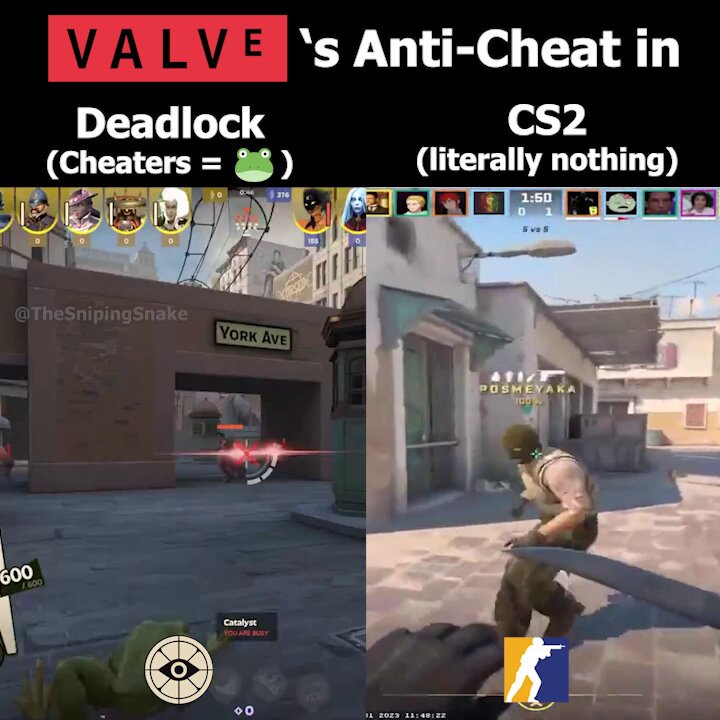Uncovering Secrets: Hookup Detectives
Explore the world of modern relationships and dating with insights from our hookup detectives.
Cheating in CS2: Why Anti-Cheat is the New Guardian of Fair Play
Discover how cutting-edge anti-cheat technology is revolutionizing fair play in CS2. Say goodbye to cheats and hello to a level playing field!
Understanding the Mechanisms of CS2's Anti-Cheat: How It Protects Players
Counter-Strike 2 (CS2)'s anti-cheat mechanisms play a crucial role in maintaining a fair and competitive gaming environment. By utilizing advanced algorithms and real-time data analysis, CS2 effectively detects cheating behaviors and prevents them from compromising the integrity of the game. These mechanisms include behavioral analysis, which monitors player actions for unusual patterns that may indicate cheating, and signature detection, which identifies known cheat software. The continuous evolution of these systems ensures that they adapt to new cheating methods, protecting players from unfair advantages.
One of the standout features of CS2's anti-cheat system is its cloud-based infrastructure, which allows for swift updates and scalability. This means that as new cheats are developed, the anti-cheat system can be promptly updated to counteract them. Players can also report suspicious activity, which feeds into the machine learning models used to enhance the system's precision. By prioritizing player safety and integrity, CS2 not only enhances the gaming experience but also fosters a more engaged and trusting player community.

Counter-Strike is a highly competitive first-person shooter game that emphasizes teamwork and strategy. Players can customize their gameplay experience in various ways, including learning how to copy crosshair settings to improve their aiming precision. With its rich history and evolving gameplay mechanics, Counter-Strike remains a favorite among gamers worldwide.
The Evolution of Gaming Anti-Cheat Systems: A Deep Dive into CS2
The evolution of gaming anti-cheat systems has been a critical aspect of ensuring fair play in competitive environments. Over the years, titles like Counter-Strike 2 (CS2) have implemented various anti-cheating measures to counteract the growing prevalence of cheats and hacks. Initially, most games relied on simple server-side checks, which were often unable to accurately detect players using third-party programs to gain an unfair advantage. However, advancements in technology and an increase in community awareness have led to the development of more sophisticated systems that not only identify cheating patterns but also adapt to emerging threats.
In CS2, the integration of machine learning algorithms and real-time behavior analysis has revolutionized the way developers combat cheating. Unlike older systems that primarily focused on known cheats, CS2's anti-cheat framework continuously analyzes player actions and compares them against established norms within the player base. By identifying anomalies and employing a robust feedback loop, CS2 creates a dynamic environment where cheats can be swiftly neutralized, preserving game integrity. As the gaming landscape evolves, the commitment to fair competition in titles like CS2 will increasingly rely on these innovative anti-cheat solutions.
Is Cheating in CS2 Becoming a Lost Cause? Exploring the Impact of Anti-Cheat Technologies
As the competitive gaming scene for CS2 continues to evolve, the issue of cheating remains at the forefront of player concerns. With the introduction of advanced anti-cheat technologies, many gamers are questioning whether cheating is becoming a lost cause. Recent updates have significantly bolstered the effectiveness of these systems, leading to a notable decline in cheating incidents. This has caused a ripple effect, where genuine players can enjoy a fair gaming experience, while cheats find themselves continuously trying to adapt to these evolving countermeasures.
However, the relentless arms race between cheat developers and anti-cheat software is far from over. Cheaters are constantly innovating, seeking out loopholes and weaknesses in CS2's protective measures. Many players have reported that while some cheats may still be effective in the short term, the long-term sustainability of such methods is becoming less viable. As anti-cheat technologies evolve, the community is left to ponder: is cheating in CS2 truly becoming a lost cause, or is it merely a phase in an ongoing battle for integrity in gaming?